新概念第二册第7课教案
- 格式:doc
- 大小:72.50 KB
- 文档页数:9
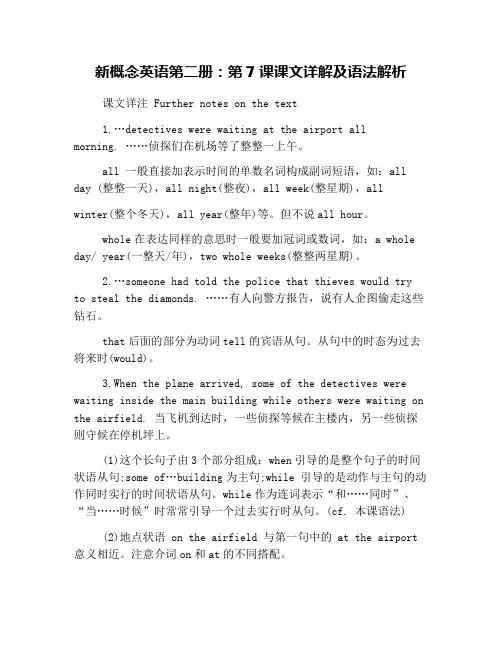
新概念英语第二册:第7课课文详解及语法解析课文详注 Further notes on the text1.…detectives were waiting at the airport all morning. ……侦探们在机场等了整整一上午。
all 一般直接加表示时间的单数名词构成副词短语,如:all day (整整一天),all night(整夜),all week(整星期),allwinter(整个冬天),all year(整年)等。
但不说all hour。
whole在表达同样的意思时一般要加冠词或数词,如:a whole day/ year(一整天/年),two whole weeks(整整两星期)。
2.…someone had told the police that thieves would try to steal the diamonds. ……有人向警方报告,说有人企图偷走这些钻石。
that后面的部分为动词tell的宾语从句。
从句中的时态为过去将来时(would)。
3.When the plane arrived, some of the detectives were waiting inside the main building while others were waiting on the airfield. 当飞机到达时,一些侦探等候在主楼内,另一些侦探则守候在停机坪上。
(1)这个长句子由3个部分组成:when引导的是整个句子的时间状语从句;some of…building为主句;while 引导的是动作与主句的动作同时实行的时间状语从句。
while作为连词表示“和……同时”、“当……时候”时常常引导一个过去实行时从句。
(cf. 本课语法)(2)地点状语 on the airfield 与第一句中的 at the airport 意义相近。
注意介词on和at的不同搭配。
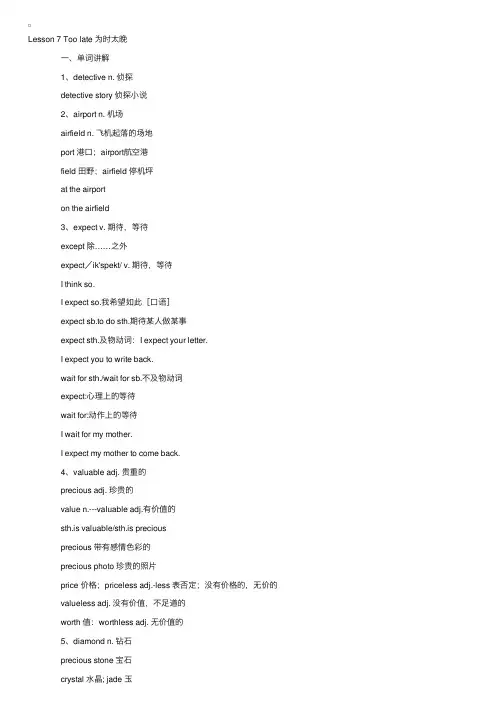
Lesson 7 Too late 为时太晚 ⼀、单词讲解 1、detective n. 侦探 detective story 侦探⼩说 2、airport n. 机场 airfield n. 飞机起落的场地 port 港⼝;airport航空港 field ⽥野;airfield 停机坪 at the airport on the airfield 3、expect v. 期待,等待 except 除……之外 expect/ik'spekt/ v. 期待,等待 I think so. I expect so.我希望如此[⼝语] expect sb.to do sth.期待某⼈做某事 expect sth.及物动词:I expect your letter. I expect you to write back. wait for sth./wait for sb.不及物动词 expect:⼼理上的等待 wait for:动作上的等待 I wait for my mother. I expect my mother to come back. 4、valuable adj. 贵重的 precious adj. 珍贵的 value n.---valuable adj.有价值的 sth.is valuable/sth.is precious precious 带有感情⾊彩的 precious photo 珍贵的照⽚ price 价格;priceless adj.-less 表否定;没有价格的,⽆价的 valueless adj. 没有价值,不⾜道的 worth 值:worthless adj. ⽆价值的 5、diamond n. 钻⽯ precious stone 宝⽯ crystal ⽔晶; jade ⽟ diamond ring 钻⽯戒指 6、steal v. 偷 steal,stole,stolen steal sth. 偷(某物) rob sb. 抢(某⼈) My wallet was stolen. I was robbed. rob the bank 7、main adj. 主要的 main building; main street main sentence; main idea 不与⼈连⽤ 8、guard n. 警戒,守卫 life guard 救⽣员/body guard 保镖 ⼆、语法重点--宾语 1、v.+prep.介词+宾语 come and look at... I am looking for... 2、 v.+prep. 介词/adv.代表不同的意思 look at 看;look after照料 3、v.+prep./adv.+宾语(n.) v.+宾语(n./pron.)+prep./adv. take off the coat……take the coat off/take it off coat n.作宾语 put on your shoes/put your shoes on/put them on 笔记: 宾语的位置和词性取决于施加动作的动词(在乐加乐学过新⼆的孩⼦应该知道宾语的构成和位⼦) 介词出现,⼀定要有宾语,所以 v.+prep.+宾语(n.) 副词可省略.v.+宾语(n./pron.)+adv. 或 v.+adv.+宾语(n.) at,after prep; off adv. vt.+宾语 vi.+prep.+宾语 take vt./look vi. I always take money with me. 附上及物动词和不及物动词讲解: A 有些动词只是及物动词; 它们不可以单独⽤,后⾯必须跟宾语。
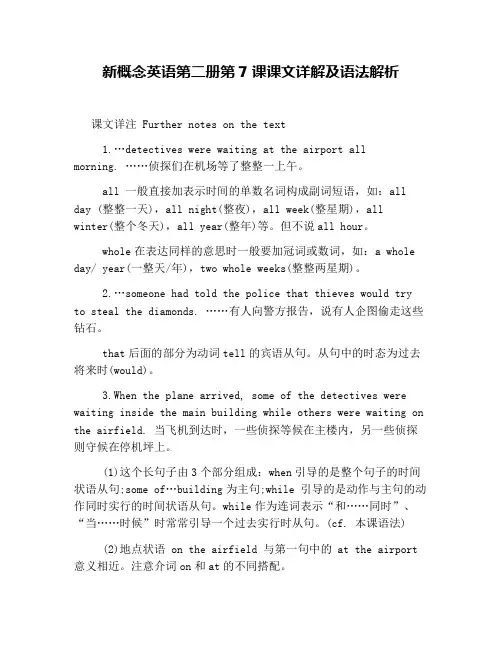
新概念英语第二册第7课课文详解及语法解析课文详注 Further notes on the text1.…detectives were waiting at the airport all morning. ……侦探们在机场等了整整一上午。
all 一般直接加表示时间的单数名词构成副词短语,如:all day (整整一天),all night(整夜),all week(整星期),allwinter(整个冬天),all year(整年)等。
但不说all hour。
whole在表达同样的意思时一般要加冠词或数词,如:a whole day/ year(一整天/年),two whole weeks(整整两星期)。
2.…someone had told the police that thieves would try to steal the diamonds. ……有人向警方报告,说有人企图偷走这些钻石。
that后面的部分为动词tell的宾语从句。
从句中的时态为过去将来时(would)。
3.When the plane arrived, some of the detectives were waiting inside the main building while others were waiting on the airfield. 当飞机到达时,一些侦探等候在主楼内,另一些侦探则守候在停机坪上。
(1)这个长句子由3个部分组成:when引导的是整个句子的时间状语从句;some of…building为主句;while 引导的是动作与主句的动作同时实行的时间状语从句。
while作为连词表示“和……同时”、“当……时候”时常常引导一个过去实行时从句。
(cf. 本课语法)(2)地点状语 on the airfield 与第一句中的 at the airport 意义相近。
注意介词on和at的不同搭配。
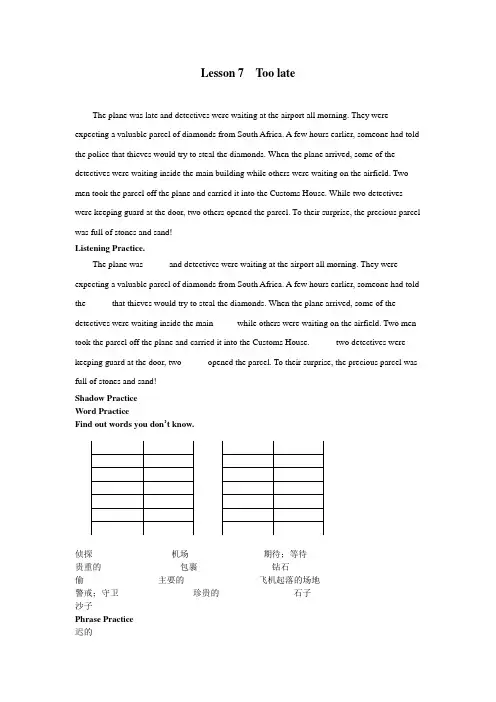
Lesson 7 Too lateThe plane was late and detectives were waiting at the airport all morning. They wereexpecting a valuable parcel of diamonds from South Africa. A few hours earlier, someone had told the police that thieves would try to steal the diamonds. When the plane arrived, some of the detectives were waiting inside the main building while others were waiting on the airfield. Two men took the parcel off the plane and carried it into the Customs House. While two detectives were keeping guard at the door, two others opened the parcel. To their surprise, the precious parcel was full of stones and sand!Listening Practice.The plane was _____ and detectives were waiting at the airport all morning. They were expecting a valuable parcel of diamonds from South Africa. A few hours earlier, someone had told the _____ that thieves would try to steal the diamonds. When the plane arrived, some of the detectives were waiting inside the main _____while others were waiting on the airfield. Two men took the parcel off the plane and carried it into the Customs House. _____ two detectives were keeping guard at the door, two _____ opened the parcel. To their surprise, the precious parcel was full of stones and sand!Shadow PracticeWord PracticeFind out words you don ’t know.侦探__________________机场_________________期待;等待__________________ 贵重的__________________包裹_________________钻石_________________偷_________________主要的_________________飞机起落的场地_________________ 警戒;守卫_________________珍贵的_________________石子_________________ 沙子_________________Phrase Practice迟的___________________________在机场___________________________整个早上___________________________一包钻石___________________________南非_________________________几个小时前___________________________告诉警察___________________________尽力做某事_______________________偷钻石___________________________一些侦探___________________________在主楼内_______________________在停机坪上_______________________海关_______________________保持警卫_______________________打开包裹_______________________令某人吃惊的是_______________________充满_______________________Sentence PracticeTranslate the sentences.飞机误点了,侦探们在机场等了整整一个上午。

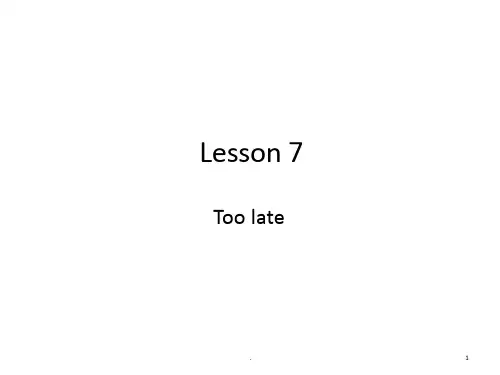
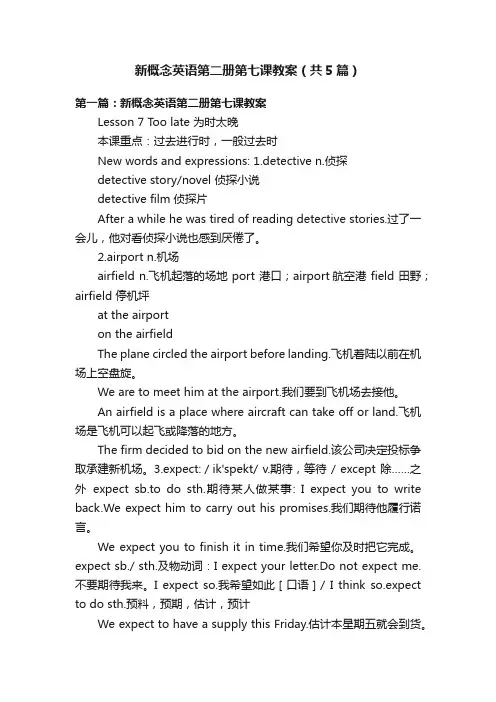
新概念英语第二册第七课教案(共5篇)第一篇:新概念英语第二册第七课教案Lesson 7 Too late 为时太晚本课重点:过去进行时,一般过去时New words and expressions: 1.detective n.侦探detective story/novel 侦探小说detective film 侦探片After a while he was tired of reading detective stories.过了一会儿,他对看侦探小说也感到厌倦了。
2.airport n.机场airfield n.飞机起落的场地 port 港口;airport航空港 field 田野;airfield 停机坪at the airporton the airfieldThe plane circled the airport before landing.飞机着陆以前在机场上空盘旋。
We are to meet him at the airport.我们要到飞机场去接他。
An airfield is a place where aircraft can take off or land.飞机场是飞机可以起飞或降落的地方。
The firm decided to bid on the new airfield.该公司决定投标争取承建新机场。
3.expect:/ik'spekt/ v.期待,等待 / except 除……之外expect sb.to do sth.期待某人做某事: I expect you to write back.We expect him to carry out his promises.我们期待他履行诺言。
We expect you to finish it in time.我们希望你及时把它完成。
expect sb./ sth.及物动词:I expect your letter.Do not expect me.不要期待我来。
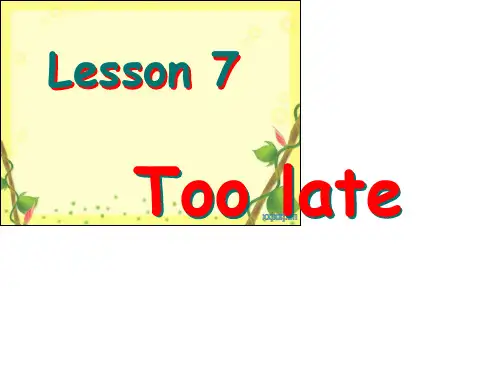
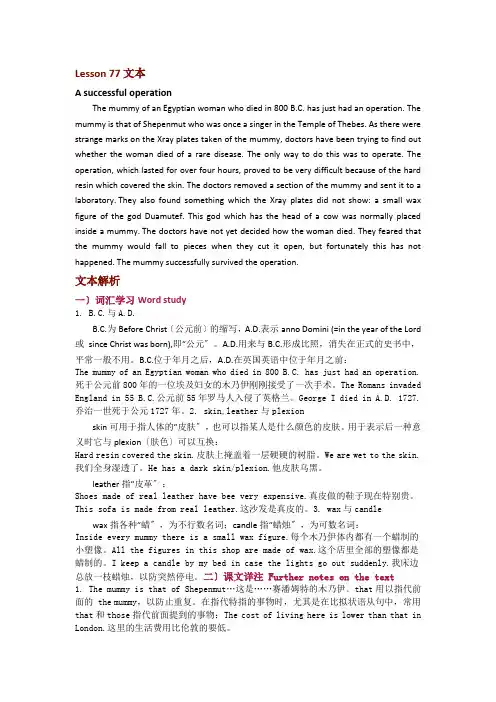
Lesson 77 文本A successful operationThe mummy of an Egyptian woman who died in 800 B.C. has just had an operation. The mummy is that of Shepenmut who was once a singer in the Temple of Thebes. As there were strange marks on the Xray plates taken of the mummy, doctors have been trying to find out whether the woman died of a rare disease. The only way to do this was to operate. The operation, which lasted for over four hours, proved to be very difficult because of the hard resin which covered the skin. The doctors removed a section of the mummy and sent it to a laboratory. They also found something which the Xray plates did not show: a small wax figure of the god Duamutef. This god which has the head of a cow was normally placed inside a mummy. The doctors have not yet decided how the woman died. They feared that the mummy would fall to pieces when they cut it open, but fortunately this has not happened. The mummy successfully survived the operation.文本解析一〕词汇学习Word study1. B.C.与A.D.B.C.为Before Christ〔公元前〕的缩写,A.D.表示anno Domini (=in the year of the Lord 或since Christ was born),即“公元〞。
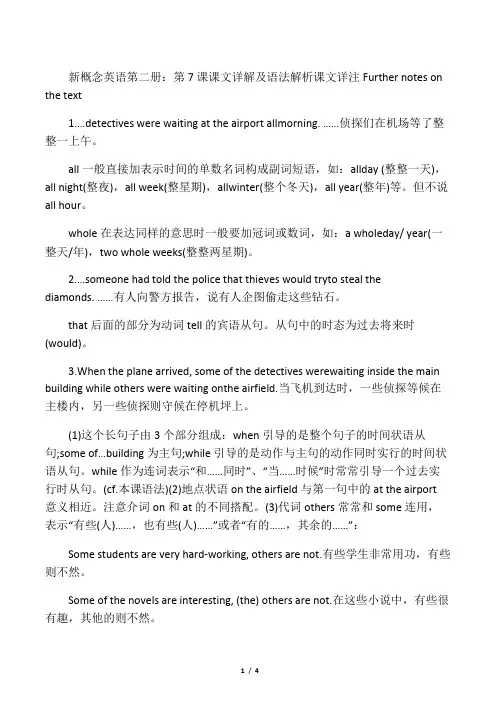
新概念英语第二册:第7课课文详解及语法解析课文详注Further notes on the text1.…detectives were waiting at the airport allmorning. ……侦探们在机场等了整整一上午。
all一般直接加表示时间的单数名词构成副词短语,如:allday (整整一天),all night(整夜),all week(整星期),allwinter(整个冬天),all year(整年)等。
但不说all hour。
whole在表达同样的意思时一般要加冠词或数词,如:a wholeday/ year(一整天/年),two whole weeks(整整两星期)。
2.…someone had told the police that thieves would tryto steal the diamonds. ……有人向警方报告,说有人企图偷走这些钻石。
that后面的部分为动词tell的宾语从句。
从句中的时态为过去将来时(would)。
3.When the plane arrived, some of the detectives werewaiting inside the main building while others were waiting onthe airfield.当飞机到达时,一些侦探等候在主楼内,另一些侦探则守候在停机坪上。
(1)这个长句子由3个部分组成:when引导的是整个句子的时间状语从句;some of…building为主句;while引导的是动作与主句的动作同时实行的时间状语从句。
while作为连词表示“和……同时”、“当……时候”时常常引导一个过去实行时从句。
(cf.本课语法)(2)地点状语on the airfield与第一句中的at the airport意义相近。
注意介词on和at的不同搭配。
(3)代词others常常和some连用,表示“有些(人)……,也有些(人)……”或者“有的……,其余的……”:Some students are very hard-working, others are not.有些学生非常用功,有些则不然。
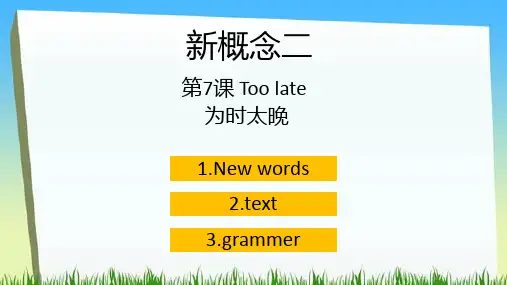
§Lesson 7Too late为时太晚【New wordsandexpressions】生词和短语★detective n. 侦探detective story 侦探小说★airportn.机场★airfield n. 飞机起落的场地port港口; airport航空港field 田野;airfield 停机坪at theairporton the airfield★expect v. 期待, 等待except(prep)除……之外expect/ik'spekt/v.期待,等待I think so.I expectso.我希望如此[口语]expect sb.todo sth.期待某人做某事expectsth.及物动词:Iexpect your letter.I expect you towrite back.waitforsth./wait for sb.不及物动词expect:心理上的等待wait for:动作上的等待Iwait for my mother.Iexpect my mother to come back.★valuable adj.贵重的★preciousadj. 珍贵的valuen.v---valuable adj.有价值的sth.is valuable/sth.is preciousprecious带有感情色彩的preciousphoto珍贵的照片price 价格;pricelessadj.-less表否定; 没有价格的, 无价的valueless adj.没有价值,不足道的worth值:worthlessadj. 无价值的★parcel n. 包裹★diamond n. 钻石precious stone 宝石crystal 水晶; jade 玉diamond ring 钻石戒指★stealv.偷steal,stole,stolensteal sth. 偷(某物)robsb. 抢(某人)Mywallet was stolen.Iwasrobbed.rob the bank 与地点相连的偷抢都用rob+地点★main adj.主要的main building;main streetmain sentence;main idea但不能与人连用★guard n. 警戒,守卫life guard 救生员/bodyguard 保镖★stone n. 石子★sandn.沙子本课重点:过去进行时, 一般过去时一般过去时与现在完成时共同点: 动作在过去都做过了.区别: 过去式只能强调过去的事,和现在没有任何关系.I ate a piece ofbread.现在完成时, 过去的事情对现在产生的影响.I have eaten a pieceof bread this morning.I'm not hungry.The clock stopped.陈述事实The clockhas stopped.过去的事实对现在造成影响It snowedyesterday.It has snowed yesterday.强调对现在造成影响【Text】Lesson 7 Too late为时太晚First listenand thenanswer the question. 听录音,然后回答以下问题.Did thedetectives save the diamonds?Theplane waslateand detectives were waiting attheairport all morning. Theywere expectingavaluable parcel ofdiamonds from South Africa. A fewhours earlier, someone hadtold the police thatthieves would try to steal the diamonds. When the plane arrived,someof the dete ctives were waitinginsidethe main building whileotherswere waiting on the airfield.Two men took the parceloff the planeandcarrieditint othe Customs House. Whiletwodetectiveswere keeping guard atthedoor, twoothers opened the parcel.To their surprise, the precious parcel was fullof stones andsand!参考译文飞机误点了,侦探们在机场等了整整一上午. 他们正期待从南非来的一个装着钻石的贵重包裹. 数小时以前, 有人向警方报告, 说有人企图偷走这些钻石.当飞机到达时, 一些侦探等候在主楼内,另一些侦探则守候在停机坪上. 有两个人把包裹拿下飞机, 进了海关. 这时两个侦探把住门口, 另外两个侦探打开了包裹. 令他们吃惊的是, 那珍贵的包裹里面装的全是石头和沙子!【课文讲解】all morning=allthe morningThe plane was late飞机晚(点)了The bus was late./The train was late.detectives 没有强调一些侦探或者那些侦探,强调侦探这种人笼统感念,可不加some,the....werewaiting... 故事背景, 用进行时态They were expecting...期待着心理上的等They were waiting for...a valuable parcel of diamondsa cupof tea强调的是茶South Africa 南非afew hours earlier几个小时以前afewhoursbefore/a few hours agosomeone had told...过去完成时, 过去以前发生的事情...that thieves would tryto...would+do 过去将来时,间接方式,转述,站在过去看未来that 从句.典型的宾语从句, 起转述作用steal sth.one...the other.../some...others...others=other+名词复数...theplanearrived,...were waiting inside the main buildingwhile others were waiting on...when; while 当……时候while能用when代替;但是when却不一定能用while代替.while+从句,动作一定会延续when+延续性动词/瞬间动词; when he arrivedwhen hediedwhen,while强调动作同时发生过去进行时:在过去的某一点时间, 或者是过去某一动作同时发生的另外一个动作瞬间动词(arrive)无进行时态Iam arriving进行时态表示将要When he arrived,I washaving dinner.同时发生的两个动作, 均用过去进行时When Iwas doingmyhomework,mymother wascooking.When my mother was doing the housework,myfatherwaswatching TV.同时发生的两个动作1.一个用一般过去时, 另一个用过去进行时2.分工的情况,均用过去进行时Whenthe planearrived,...were waiting insidethe main buildingwhile others werewaiting on...Two mentooktheparcel off...take sth.off...=takesth.awayfrom...and carried it into...carried 表示看得很重CustomsHouse海关While......were keeping guard at the door,two others opened the parcel.表面上是分工, 两个动作同时发生, 不是同时开始同时结束,延续时间不一致,长一点时间的动作用进行时态, 短时间的动作用过去时.When someoneknockedatthedoor,I was having dinner.keep guard守卫; at the door在门边(固定搭配)twoothers=two other detectivesTotheirsurprisetoone'ssurprise,让某人惊讶的是To my surprise,theteacher was late.To one’s +表达人情绪的名词to one's joyTo my joy, my mother came here yesterday.to one'sexcitementToour excitement,our team wins.be full of ...装满Mybag was full ofbooks.The cup is full of water.总结a few hoursealier 几个小时以前two otherstoone's surprise,...be full of 装满重点: 过去动作同时发生的时态1.过去两个动作同时发生, 习惯上一个用一般过去时,另一个用过去进行时;动作长用过去进行时,动作短用一般过去时; 分工的情况,动作的开始时间和结束时间几乎相同,均用过去进行时;I was listening to the radio,mysister wasdancing.2.两个动作在同时段进行, 在不同时间结束, 先发生的动作未结束, 另一个动作发生, 先发生的动作用进行时态,另一个动作用过去时.When the telephonerang,I was opening thedoor.先开门Whenthetelephone was ringing, I openedthe door. 电话先响3.瞬间动词没有进行时态, 所以两个动作同时发生, 延续性动词用进行时态, 瞬间动词使用过去时态.【Special Difficulties】难点Do you rememberthese sentences?comeand lookat...Iam lookingfor...v.+prep.+宾语Now read these sentencesv.+prep./adv.代表不同的意思look at 看;lookafter照料v.+prep./adv.+宾语(n.)v.+宾语(n./pron.)+prep./adv.take offthecoat......take the coatoff/take it offcoat n.作宾语put onyour shoes/put your shoes on/put them on宾语的位置和词性取决于施加动作的动词介词出现, 一定要有宾语, 所以v.+prep.+宾语(n.)副词可省略.v.+宾语(n./pron.)+adv. 或v.+adv.+宾语(n.)at,afterprep;off adv.vt.+宾语(及物)vi.+prep.+宾语(不及物)takevt./lookvi.I always take money withme.我身上总带些钱Exerciseput thebook on the desk--> put vt.put out...-->outadv.He is looking for his pen.......forprep.1 Hegaveawayall his books.2 Shewokeup thechildren earlythismorning.3Heis looking forhis umbrella.4They cut offthe king's head.5 Put onyourhat and coat.6Giveit backto your brother.7 Helpmetolift up this table.8T akeoff your shoes andput onyourslippers.9He is looking at the picture.10Send heraway or she will cause trouble.11 They have pulled downthe oldbuilding.12 Makeupyourmind.13 He asked for permission to leave.She threw away all thoseoldnewspapers.1.give away...-->give(vt.)-->give...away2.woke up...-->wake sb.(vt.);up(adv.)-->wake...up...wakeme up.叫醒我;代词做宾语, 放在动词与副词之间3.look for...-->look(vi.)4.cut off...-->cut(vt.);cut oneself;cut hair5.put on...-->put...on...6.giveit back...-->it(pron.)7.lift up...-->up(adv.)可省略;lift(up)sth;lift sth.up8.take off...;puton...--->take(vt.)put(vt.)9.lookat...--->look(vi.)10.send heraway...---her(pron.)11.pull down...-->pull(vt.);down(adv.)pull one's leg 开玩笑You are pulling myleg.你开我玩笑12.makeup...--->make(vt.)up one's mind习惯用法不换,语法上可换13.ask for...-->ask(sb.)for sth.其实是省略sb.故不可换14.throw away...-->throw(vt.)...away...宾语的位置和词性取决于施加动作的动词vt.+adv.+宾语(n.)vt.+宾语(n./pron.)+adv.vi+prep.+宾语(n.)look at her;at(prep)put him off;off(adv)词组当中的练习, 短语beinterested in 不能用at on等代替如果不能接收, 就记住--放弃如果已经说过, 还没有明白, 就要执著弄懂【Multiple choice questions】多项选择题5 Someone had told the police thatthieveswould try tosteal the diamonds. This happened ______the plane arrived.a.before b.after c.whend.as soon as5.had done.——两个动作先后发生(一个动作结束, 另一个动作才发生)用过去完成时before:在……之前assoon as:一……就8 The detectives were ______ a valuableparcelof diamonds.a.expectingb.waiting c.expecting for d.expecting to8.expect,waitI expect so.I expectyourletter.expect somebodytodowaitforexpect somebody to expecting9 Theparcelwasvaluable.Itwas ______ .a.worth b.worthy c.precious d.value9.valuable......preciousvalue:名词worth后面一定要加动词something is worth...The book is worthreading.(动名词)Thebook is worth three dollars.Worthyadj n......be worthy of(固定搭配)This bookis worthy of being read [to beread].这本书值得一读.acts worthy ofpunishment应该受处分的行为Worthless adj......something is worthless(后面不加任何东西)10 Thethieveswanted to ______ thediamonds.a.robb.steal c.take from d.take to10.加something做宾语的一定是steal【Key structures】关键句型Exercises D1 As my father ______ (leave) the house, thepostman ______(arrive).2 Tom______(work) in the garden while I______ (sit)in the sun.3 As I ______(walk) downthestreet, I ______(meet) Charlie.4 While he ______ (read) the letter, he______(hear) a knock atthe door.5 While mother ______ (prepare) lunch, Janet______(set) the table.6 She______(drop) the tray whenI______ (speak)to her.1.As:正当将要走be doing was leaving...arrived(两个瞬间动词同时发生可能性很小, 应具体分析,故用进行时态表将来)2.was working...was sitting3.wasworking...met4.wasreading...heard:hear是不用进行时态的5.setthe table摆桌子was preparing...set6.dropped...was speaking--。
新概念二册7课讲解《新概念英语(第二册)》是一本针对英语初学者的教材,共有96课。
根据你的问题,我将为你解析第二册中的第七课。
第二册第七课的标题是"Are you a teacher?"(你是老师吗?)。
这一课主要围绕着一个关于职业的对话展开,通过对话的形式来学习询问和回答他人的职业。
以下是对这一课的多角度全面完整的回答:1. 对话内容解析:这一课的对话是由两个人进行的,他们是Peter和Ann。
对话开始时,Peter询问Ann是否是一名老师,然后Ann回答并解释她的职业。
随后,Peter继续问Ann是否在学校教书,并询问她教授的科目。
对话中还涉及到一些关于教育的问题,如学生和老师之间的关系等。
2. 语法点分析:在这一课中,我们学习了一些关于职业的特殊疑问句和回答的用法。
例如,询问职业的句子结构是,"Are you a + 职业名词?",回答可以是"Yes, I am."或"No, I'm not."。
此外,对话中还出现了一些其他的语法点,如一般现在时的用法以及一些特殊疑问词的运用等。
3. 生词解析:在这一课中,出现了一些生词,如teacher(老师)、school(学校)、subject(科目)等。
通过学习这些生词,我们可以扩展我们的词汇量,并且能够更好地理解对话内容。
4. 对话背景分析:这一课的对话背景是在一个社交场合,两个人进行了一段关于职业的对话。
这种对话场景可以帮助我们更好地理解在实际生活中如何进行类似的交流,并且可以为我们提供一些实用的表达方式。
5. 学习目标:这一课的学习目标是学习如何询问他人的职业以及如何回答这个问题。
通过学习这一课,我们可以掌握一些基本的职业词汇,并且能够在日常生活中进行简单的职业相关的对话。
总结起来,第二册第七课是一堂关于职业的英语课,通过对话的形式帮助学习者学习如何询问他人的职业以及如何回答这个问题。
Lesson 7 Too late为时太晚【New words and expressions】生词和短语(13)detective n. 侦探airport n. 机场expect v. 期待,等待valuable adj. 贵重的parcel n. 包裹diamond n. 钻石steal v. 偷main adj. 主要的airfield n. 飞机起落的场地guard n. 警戒,守卫sand n. 沙子stone n. 石子precious ['prɛʃəs] adj. 珍贵的★detective n. 侦探detective story 侦探小说★airport n. 机场★airfield n. 飞机起落的场地port 港口;airport 航空港at the airport 在机场field 田野;airfield 停机坪on the airfield 在停机坪上★expect v. 期待, 等待①vt.&vi. 预计,预料Jim has failed in mathematics as his teacher expected.正如他老师所预料的那样,吉姆数学考试没及格。
②vt. 等待,期待,盼望(心理上的等待)They are expecting guests tonight. 今晚有人要去他们那里作客。
expect所表示的等待一般暗含着根据某些信息或规律而作出相应反应的意思,而wait for 主要持续“等待”这个动作本身。
expect sth. I expect a letter from Jimmy.expect sb.to do sth. 期待某人做某事I expect you to write back.I expect my mother to come back.wait for sth./sb. 动作上的等待I wait for my mother.③vt. 认为,猜想(一般用于口语)I expect so./I think so. 我希望如此[口语]I expect you’ve heard the news. 我想你已经听到这个消息了。
★valuable adj. 贵重的value n.&v. 价值;valuable adj.有价值的sth.is valuable★precious adj. 珍贵的(带有一定的感情色彩)sth.is preciousprecious photo 珍贵的照片-less 表否定; priceless adj. 没有价格的, 无价的valueless adj. 没有价值, 不足道的worthless adj. 无价值的★diamond n. 钻石diamond ring 钻石戒指precious stone 宝石;crystal ['krɪst!]水晶;jade [dʒed]玉★steal(stole,stolen)v. 偷①vt.&vi. 偷盗,行窃英语中“偷”用steal和rob 来表达,宾语是物,用steal;宾语是人,用rob;跟地点相连,也用rob.steal sth. 偷(某物) My wallet was stolen.John never steals. 约翰从不偷东西。
rob sb. 抢(某人) I was robbed. rob the bank②vt. 巧妙地占用,偷偷地弄到手He has stolen away Mary’s heart. 他已赢得玛丽的芳心。
③vi.偷偷地行动,悄悄靠近He stole into the room.他悄悄地进了房间。
★main adj. 主要的main不能与人连用main building;main street;main sentence;main idea;★guard n. 警戒, 守卫life guard 救生员body guard 保镖stand guard 站岗,放哨keep guard 守望,警戒They kept a close guard over the thieves. 他们对小偷们严加看管。
【Text】The plane was late and detectives were waiting at the airport all morning. They were expecting a valuable parcel of diamonds from South Africa. A few hours earlier, someone had told the police that thieves would try to steal the diamonds. When the plane arrived, some of the detectives were waiting inside the main building while others were waiting on the airfield. Two men took the parcel off the plane and carried it into the Customs House. While two detectives were keeping guard at the door, two others opened the parcel. To their surprise, the precious parcel was full of stones and sand!参考译文:飞机误点了, 侦探们在机场等了整整一上午. 他们正期待从南非来的一个装着钻石的贵重包裹. 数小时以前, 有人向警方报告, 说有人企图偷走这些钻石. 当飞机到达时, 一些侦探等候在主楼内, 另一些侦探则守候在停机坪上. 有两个人把包裹拿下飞机, 进了海关. 这时两个侦探把住门口, 另外两个侦探打开了包裹. 令他们吃惊的是, 那珍贵的包裹里面装的全是石头和沙子!【课文讲解】1、The plane was late and detectives were waiting at the airport all morning.all 一般直接加表示时间的单数名词构成副词短语,如:all day,all night,all week,all winter,all year等。
但不说all hour。
whole在表达同样的意思时一般要加冠词或数词,如a whole day/year,two whole weeks。
all morning=all the morningThe plane was late 飞机晚(点)了The bus was late./The train was late. detectives 没有强调一些侦探或者那些侦探, 强调侦探这种人,笼统感念, 可不加some, the.2、A few hours earlier, someone had told the police that thieves would try to steal the diamonds.a few hours earlier 几个小时以前= a few hours before/a few hours ago would +do 过去将来时,间接方式, 转述, 站在过去看未来3、When the plane arrived, some of the detectives were waiting inside the main building while others were waiting on the airfield.代词others常常和some连用,表示“有些(人)……,也有些(人)……”或“有的……,其余的……”one…the other…一个…另一个…some…others…一些…另一些…Some students are very hard-working, others are not.others=other+名词复数4、Two men took the parcel off the plane and carried it into the Customs House. Customs House 海关take sth. off…=take sth. away from…and carried it into… carried 表示看得很重5、While two detectives were keeping guard at the door, two others opened the parcel. To their surprise, the precious parcel was full of stones and sand!…were keeping guard at the door, two others opened the parcel.表面上是分工, 两个动作同时发生, 不是同时开始同时结束, 延续时间不一致, 长一点时间的动作用进行时态, 短时间的动作用过去时.When someone knocked at the door, I was having dinner.keep guard 守卫They kept a close guard over the thieves.at the door 在门边(固定搭配) two others=two other detectives to one's surprise,让某人惊讶的是To my surprise, the teacher was late. To one’s +表达人情绪的名词to one's joy [dʒɔɪ]欢乐,高兴To my joy, my mother came here yesterday.to one's excitement [ɪk'saɪtmənt]刺激;兴奋,激动To our excitement, our team wins.be full of ...装满My bag was full of books. The cup is full of water.【Key structures】过去进行时: 过去进行时的构成:be的过去式+现在分词过去进行时和一般过去时经常同在一个句子里使用。
过去进行时表示过去正在进行的动作或情况,一般过去时则表示比较短暂的动作或事件。
正在进行中的动作或情况往往由连词when,while,as,just as等引导。